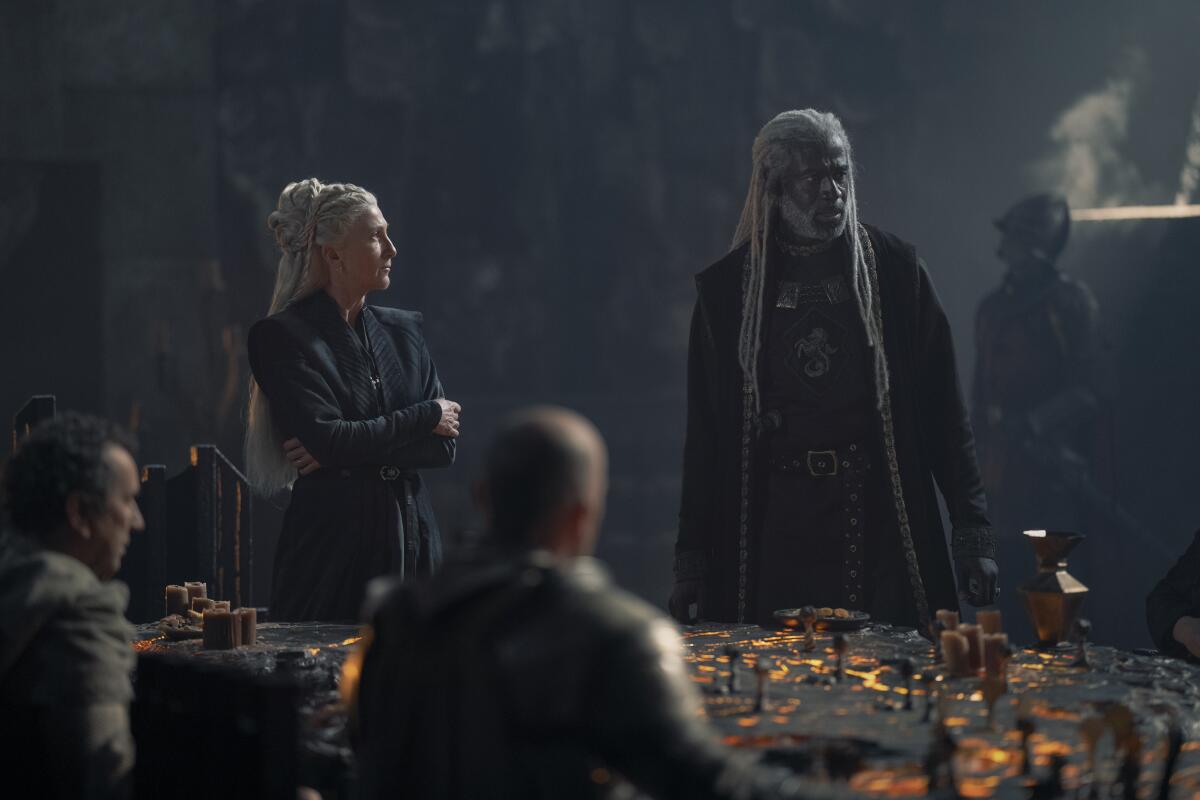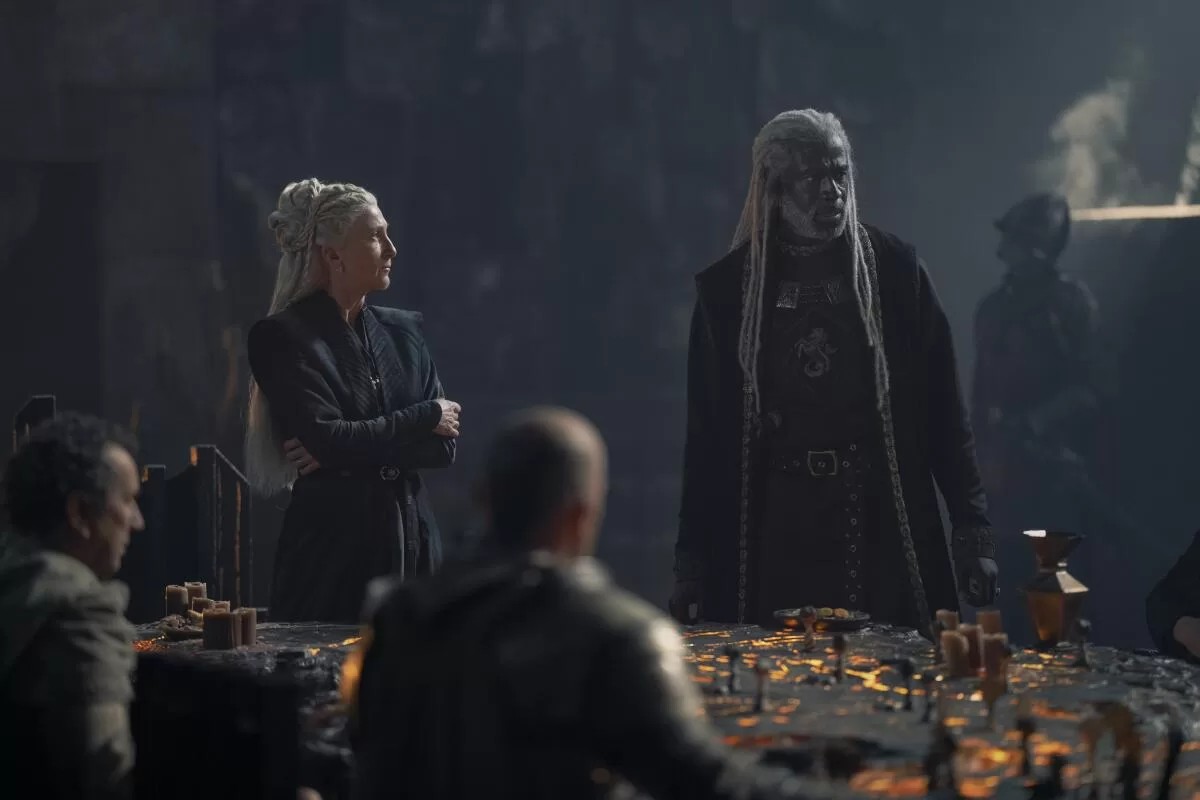This story contains spoilers from “House of the Dragon” Season 2, Episode 4, “The Red Dragon and the Gold.”
The Queen Who Never Was is no more.
In Sunday’s episode of “House of the Dragon,” “The Red Dragon and the Gold,” Princess Rhaenys Targaryen (Eve Best) volunteers to take her dragon, Meleys, into battle at Rook’s Rest, which is besieged by the Greens’ army, led by Ser Criston Cole.
She encounters two other dragon-riding Targaryens: Aegon and his beast Sunfyre, who are quickly downed, and Aemond and the ferocious Vhagar, who prove to be more formidable opponents. Vhagar deals a fatal blow to the much smaller Meleys, who falls from the sky. With a look of peaceful resignation on her face, Rhaenys plummets to certain death.
Her fate — and Aegon’s uncertain future — marks what is sure to be an escalation in the Targaryen family civil war known as the Dance of the Dragons. Rhaenys, who was passed over in the line of succession in favor of King Viserys (Paddy Considine) because of her gender — only to see him name his daughter Rhaenyra (Emma D’Arcy) as his heir — was a rare voice of restraint and caution in the harsh world of Westeros, breaking out the fiery beasts only when absolutely necessary.
Rhaenys’ demise also means “House of the Dragon” viewers will be deprived of Best, a regal actor who infused the role with steely poise and quiet wisdom. Best has some experience with playing women in close proximity to the throne, having starred as Carole Middleton in the final season of “The Crown” and Wallis Simpson in “The King’s Speech.” From her home in Italy — where birds could be heard chirping in the background — she spoke with The Times about her character’s farewell, and the real-world inspiration she drew from a certain female politician.
Presumably you had some idea that things would end this way for Rhaenys. But how did you react when you read the script?
It’s the nature of the beast. If you’re part of the “Game of Thrones” franchise, the strong likelihood is that there’s going to be a sticky end at some point. I knew [Rhaenys was going to die], I just didn’t know exactly when.
I was devastated on her behalf. I think she’s such a magnificent character and a magnificent woman. There’s that wonderful film “The Last Samurai.” There’s similar territory with Rhaenys. I said to Ryan [showrunner Ryan J. Condal] at the end of last season, “I want her to go full samurai when when things kick off,” because up until that moment in Season 1, when she breaks through her own glass ceiling on the dragon so fantastically, she stayed very neutral. She’s trodden very lightly through the minefield.
When you see these noble characters, these warriors with truth and goodness on their side, [dying], it’s agony. In the context of this world, it’s such a tremendous loss. In Westeros, as in our world, enlightened feminine role models are vital and much needed. That’s absolutely the role that she plays, particularly in Season 2 — this beacon, like an instruction manual to Rhaenyra. This is what a good ruler does. This is how you lead. That’s something that’s always struck me about the nature of this particular story, the backbone of it being these women being thrust into the midst of a patriarchal system that is in disarray.
What Rhaenys represents is someone with absolute authority, power, wisdom, intelligence, expertise, political savvy and utter compassion — a constant awareness of [the need for] collaboration and making a choice for love, as opposed to destruction.

Eve Best as Princess Rhaenys Targaryen and Steve Toussaint as Lord Corlys Velaryon in “House of the Dragon.”
(Ollie Upton / HBO)
Did you think about any real–world figures, whether historical or contemporary, in relation to this character? There have been a lot of Rhaenys-like women.
Absolutely, 100%, almost every single great woman you can think of [has] an element of [Rhaenys]. Sara Hess, who’s the one of the executive producers and the lead writers for the show, said to me on the first day, “There’s so much of Hillary Clinton [in Rhaenys].” God knows you couldn’t compare Viserys to the other one [former President Trump], but the similarities are very clear — to see that the person who is absolutely, hands down, best suited for the job is sidelined simply because she’s a woman, and then has to somehow find her way.
One of the things that gave me the most respect for Hillary Clinton was in the aftermath of [the 2016 election], how she navigated her role/non-role and brilliantly maintained her dignity, self-respect and leadership. That felt like territory that Rhaenys was treading.
I felt keenly aware of how extremely difficult that is, that particular dance — to not let the inevitable human disappointment turn to darker feelings of revenge, resentment, blame, to let none of it fester, as we see it is starting to taint choices that [Rhaenyra and Alicent] are making. We see them both going down these rabbit holes of potential disaster because of their personal circumstances. Rhaenys somehow manages to stay above it all in spite of every single blow that’s thrown at her. The poetry of her literally coming to an end in the sky on her dragon and letting go into eternity is perfect.
Why do you think Rhaenys ultimately sided with Rhaenyra and Daemon, despite everything that happened to her children because of them (and her own claim to the throne)?
The decision to side with them is really tough, but yet again, she takes the personal out of the equation. The bigger picture is that Rhaenyra is absolutely the heir to the throne. Rhaenys has such a strong feeling of “not again on my watch can this story be told. This is not going to happen again. Literally over my dead body.”
It’s very clear that [Rhaenyra] is the infinitely more sensible choice than Aegon. On all fronts, it’s the right thing to do. It’s almost like Rhaenys is programmed to do the right thing. She puts away her personal feelings, which is so hard to do. It’s such a strong temptation to scratch her eyes out or just go off back to Driftmark with Corlys, sit looking at the sunset and wash her hands of all of them.
We’ve seen Rhaenys urge restraint over and over again. Why does she decide to use deadly force this time?
It’s reached the moment when it’s actually necessary. There’s a point of no return. She’s tried everything, she’s argued for restraint, collaboration and communication. She [told Rhaenyra] to go talk it out with Alicent, sister to sister, because these two women love each other and they have the power to heal.
The Black Council spends a lot of time debating whether or not to unleash the dragons. When we were rehearsing, I said, “What’s the context? How can we relate to this?” And Ryan said, straightaway, “Nuclear war.” Nuclear war is inevitable [in this world], and she knows 100% that she’s the last grown-up in the room, and the only person that can make that take that action.
The moment when she says, “Send me,” was changed at the last minute. Sara Hess, one of the writers, suggested that we change it to, “You must send me,” which is so brilliant, because it’s an instruction, almost like her last piece of guidance. She knows that she’s sacrificing herself, effectively. She knows that it’s the red button, and if anybody’s going to have the responsibility for pressing that red button and dealing with the appalling, devastating weight of that action, it has to be her, because she’s the one who can cope with it, not just physically, but emotionally. I think she knows damn well that it is a kamikaze mission and is downplaying it.
Tell me about shooting the battle sequence. What’s the hardest part of riding a dragon?
Technically, it’s incredibly demanding and exhausting. I certainly feel my age, I don’t think this is my comfort zone at all. I kept having to ask for many more cushions. It was two weeks solid, just me, all morning and evening, all afternoon, doing quite a lot of physical stuff. That was a challenge. But the more challenging part was the emotional story. The moment of their joint demise was my penultimate shot. The buildup to it was quite intense. I was feeling a lot of pressure to make a good death, to do the character justice.
Ryan very sweetly came to set and gave a lovely speech, saying goodbye. The spotlight on this moment just became more and more unbearable. It was complicated to do the camera angles, and they had to prep for everything. I was standing about, waiting and feeling more anxious. By the time [we got to it], I was a pressure cooker ready to explode. I was strapped on — and it was over in a flash. We did two takes, and that was it, which was perfect. In that moment, what was key about it for her was this absolute, letting go and acceptance. This is exactly what one goes through as an actor: In the end, you have to just let go and accept because you’re not in control.
